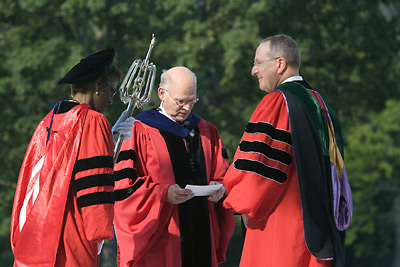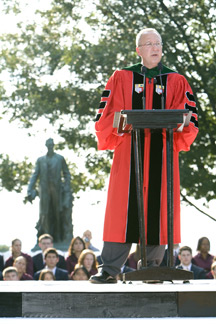President David Skorton speaks of 'the dance that is and must be Cornell' during novel inaugural ceremony
By Franklin Crawford

Roll over, Ezra.
"That most improbable and most magnificent of compounds: Cornell University" has inaugurated David J. Skorton as its 12th president. The quote belongs to Skorton -- and now, officially, to the university's highest office. During an unprecedented and revelatory inaugural ceremony -- replete with poetry, music and song -- on Cornell's Arts Quad today, it was clear that certain Cornell traditions will be honored and respected, but there is a brand-new beat playing far above Cayuga's waters. The good doctor, is in.
During his address, Skorton announced five propositions that outlined his vision for the university: strengthening the undergraduate experience; optimizing the employee environment; consolidating relationships among Cornell's disparate campuses; promoting the arts, humanities and social sciences; and using Cornell's land-grant and outreach missions to better serve global needs.
"… We are most actualized as a faculty, staff and student body when our efforts affect those beyond our boundaries," Skorton said. "Whether the focus is on diversity and the campus climate or on Ithaca, Tompkins County, New York State, the United States or the global community, Cornell must look ever outward, ever more broadly."
Skorton stepped into the future with his speech, "Dance: An Inaugural Offering to Cornell University," that opened with an impressionistic "sprung rhythm" psalm of the university which telescoped into the present.

"Today, September seventh, two thousand six, on the 133rd anniversary of [eminent Cornell historian] Carl Becker's birth near Waterloo, Iowa, as we near the 200th anniversary of Ezra Cornell's birth, as we glimpse the first, hazy outlines of our upcoming sesquicentennial, let us now accept all of the rhythms, music, planning, reconsideration, redrafting, replanning, restarting and consummation -- the dance that is and must be -- Cornell," he said.
Skorton's address, whose theme of dance and of optimism was an exercise in creative license befitting an advocate for the arts and humanities, served as an expression of the kaleidoscopic heart and soul of Cornell's new leader. It also was a mirror reflecting the intellectual, cultural and social community -- as Skorton has sounded it out thus far.
By turns poetic and philosophical, the address included three musical interludes with performances by two downtown Ithaca church choirs, the Cornell Klezmer Ensemble and virtuoso violinist Simon Shaheen and friends.
The address was more than a departure from the past. It was a Mars rover of a speech that never lost contact with the earthly sphere. He likened the manifold activities of the university itself and the pursuits of Cornell faculty to a set of dances in which "the context of each dance is the same, but the details of each dancer's movements are never the same and never predictable. For it is the unpredictability of discovery and creativity that defines Cornell and that will continue to do so generation after generation.
"… Among all the other inquiry, discovery and creativity in our universities, there is dance, there is music, there is the seed of public culture that transcends the immediate, the routine, that of which we claim to be so sure but from which we are in truth quite disconnected."
Until yesterday's ceremony, the Cornell community has had but fleeting glimpses of its new leader. On this day, they were treated to David Skorton the scientist, the thinker, the ethicist, the humanist, the jazz artist as well as the cardiologist; the first child in his family to attend college, the enlightened administrator with a sense of humor and of daring, and, perhaps above all, Skorton, the optimist.
"What is the president -- what role should that person play?" Skorton asked. "The chief, most reliably optimistic functionary -- often, as a friend noted, one who is more optimistic than the facts may support."
Picking up this motif, he later said: "What can I offer? Two things and two things only: a careful listening, translation and support of the vision of Cornellians, and a re-establishment and strengthening of the optimism that underlies our every action."
The president's address followed introductions and welcomes from Cornell Board of Trustees Chairman Peter Meinig, who presided over the ceremony, and warm-hearted, personal commentary from Antonio M. Gotto Jr., the Stephen and Suzanne Weiss Dean of Weill Cornell Medical College; Provost Biddy Martin; and David Feldshuh, artistic director of Cornell's Schwartz Center for the Performing Arts, who gave the faculty address (see sidebar).
Skorton's address, free-form yet all-encompassing, closed on an upbeat note:
"As we work together to create a rhythm of optimism to catch us in our personal and institutional moments of doubt; as we explore ways to calibrate the various cadences that together guide the pace of our movement into the future, we must set our collective vision such that there will never be a boundary to where our imagination may wander, nor artificial limits to what we might accomplish. One alone, a dyad, more, many, a society of dancers are we."
Media Contact
Get Cornell news delivered right to your inbox.
Subscribe